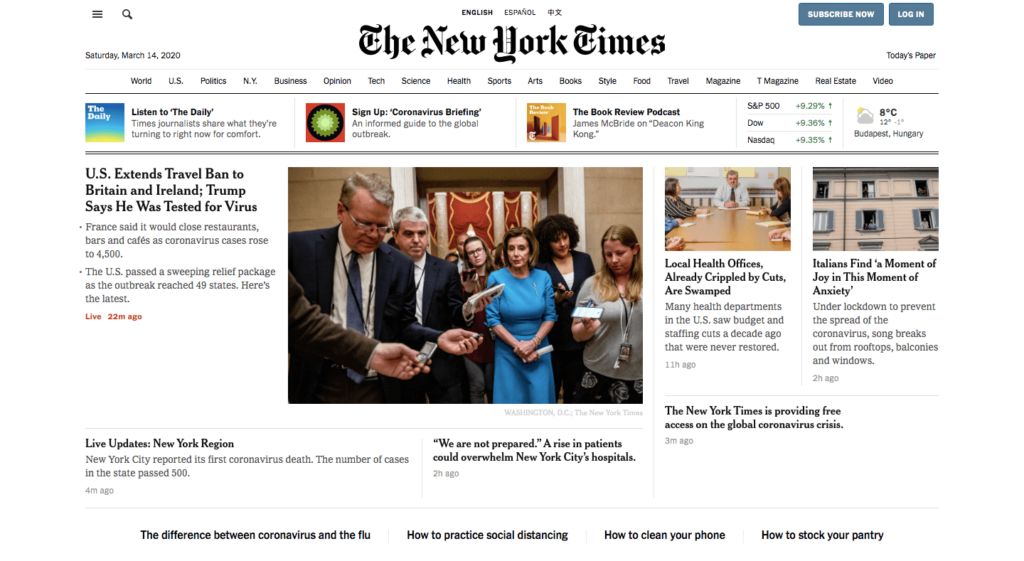A lot depends now on how companies communicate in such crisis situations. They can worsen an already difficult situation, but with proper preparation and calmness, they can also mitigate the damage. I have compiled the communication steps you or your marketing agency need to take in order to minimize economic losses. 9 crisis communication steps for the time of the coronavirus.
In recent days, it has quickly become clear that the corona virus has not only health but also serious economic consequences. Certain industries are affected very quickly and severely. Others more slowly and only indirectly. Still, it is almost certain that no matter what area you are in, you are affected. I hope you already have your business plan and contingency plan for the coming weeks and months. If not, start now, and if you are ready with that, prepare your communication plan as well.
Get informed before starting your crisis communication
Gather information and get informed from credible sources.
You can only be credible yourself if you know what is going on around you. Whether it is about the coronavirus, the subsequent government measures, or the players in your market. I’m not saying that from now on you should read every article, blog post, and Facebook post on the topic. You would probably go crazy with that, but it is essential that you are up to date with the latest relevant news. Follow official information, talk to your customers, your colleagues. Be informed and stay calm during crisis communications.

Set up a crisis team
You don’t have to make decisions alone! Call together the people who are competent in the issues affecting your business.
It is essential that the crisis team includes the owner, the CEO and the leaders of various business units marketing, logistics, customer service, HR, etc. They have the most up-to-date knowledge of these processes, and if necessary, your financial manager and legal advisor as well. If you work in a smaller organization, don’t be alone either! Your professional leader, your long-time colleague, your marketing agency can all help you.
It is important to examine the events from several perspectives, as a sudden good idea can be fatal. As a leader, it is very difficult to remain calm in such a situation. There is a lot of pressure, so you may not be able to see all sides of the coin. A team is much better at assessing the situation, opportunities, and risks than you alone. Ask for the opinions of those you trust and give them space in decision-making!

Find the person who can be the credible representative of your company
Choose a person who is credible, reliable, empathetic, and communicates well with others.
It may not be necessary for you to communicate! It may be a colleague in a leadership position, your business partner, or even your spouse. The key is that they are well-informed, know everything about the issues affecting your company, and the impact of the coronavirus. I suggest choosing someone who has been with you for a long time and is likely to stay for a long time, as this is one of the cornerstones of credibility.
Like all choices, this one has its advantages and disadvantages. If your professional leader speaks during crisis communication, he or she is certainly competent in professional matters, but may not have the best communication skills. For example, he or she may be uncomfortable in video statements, may not speak clearly, may not write in a sophisticated style, etc.
If a communication professional speaks, the style will be appropriate, and he or she will know the communication techniques that can have the best effect, but may not provide perfect answers to professional questions. You need to weigh who the best choice is. If you speak for yourself, be sure to remain not only credible but also empathetic.
Although your goal is to minimize damage and save your company, this is not the most important thing for your customers, partners, and employees. Be empathetic, talk about what concerns them. For example, whether your business is changing (moving to home office, or having reduced hours), what crisis steps you are planning that also affect your colleagues (e.g., sending them on unpaid leave), or how you will handle product replenishment if you have been selling goods from Italy, for example. And it may also be interesting for them how you solve the product supply, if until now you have sold goods from, say, Italy.

React quickly!
It is essential to react as quickly as possible under the given circumstances. Be it you alone or working together with a marketing agency, your speed of communication is key.
During a crisis, public opinion is formed based on effective, fair, and fast communication. There is nothing worse than a lack of information because in such cases, the affected parties start to fill in the gaps with their own scenarios. If they see that you are calm and quick to speak (whether it’s a Facebook post, a newsletter, or a television interview), it will reassure your partners. They will know that you are informed and know what you are doing.
However, I caution against speaking hastily. Consider the weight and consequences of your message, as there may be many affected people whose lives you are impacting.

Keep informing, there is no such thing as no comment!
You cannot afford to shut down and not provide information in this situation.
As mentioned above, in such cases, the human brain fills in the missing information according to its own scenario, which is usually worse than reality. Whether it’s about a factory closure or just the delayed delivery of ordered products, your customers want to know how the coronavirus affects you and how it affects them. You must also say this if there is no impact, because everything continues as usual. If you are in such a fortunate situation, turn it into an advantage: communicate that they are safe with you, you can deliver on time, and fulfill their needs.
The same goes for your colleagues: everyone is worried about their job and livelihood. It is not only your human duty not to keep them in uncertainty, but also a business task: you can trust and rely on a calm and balanced employee in the most difficult situations. It is especially important now that you work together and row the boat in the same direction!
The three basic pillars of crisis communication are:
- attention
- damage control
- reassurance
Keep this in mind!

Understand what your customers, colleagues, and partners need, and help them with that!
The situation caused by the coronavirus is not about you, but about the community you are a part of, and if you keep this in mind, you can also mitigate your own damage. Research, read, talk! Find out what concerns your target audience, partners, and colleagues, and find a solution to that. You don’t have to solve the whole corona situation, but in your microenvironment, you can take measures that serve the community and your stakeholders. No matter how small these things are, do them and communicate them.
Write to your customers about how you disinfect your premises, how you ensure the supply of your products, or how you switch to delivery. Write to your colleagues about how you protect their work or ensure their work, to your partners about how you have no liquidity problems, and you will pay on time. If you have problems, it’s not all lost: tell the truth. That your employees will work reduced hours, or that you will only be able to pay your suppliers late. The point is not to withhold information and to deal with every stakeholder. You may get help from where you least expect it.
Don’t panic, and don’t panic others!
I could have written this as the first point. In such difficult times, it is incredibly important not to panic. If your attention and consciousness narrow, you are simply unable to make calm and reasonable decisions. I know it’s very difficult to stay calm, I often feel the signs of panic myself when I read various articles, forums, or talk to my friends. But we, as business leaders, have a duty to show self-restraint, behave rationally, and set an example.
Before you declare anything, make any decision, take two deep breaths. I know this method is nothing new, but it always works for me. Take a walk, clear your head, and if it still seems like a thoughtful step afterwards, press the start button!
And of course, your own panic comes with the fact that you panic others. If the leader communicates in a haphazard manner, saying one thing one time and another thing another time, how would your employees know what the right direction is? If you shout back your own orders, how could your customer service representatives represent to your customers that everything is fine? Be consistent and thoughtful, because your organization is just like you!

Choose your words carefully during crisis communication!
In a crisis situation, like the current one, it is especially true that you need to choose your words carefully. A professional and creative marketing agency can help in this.
“Temporary restrictions” sounds less severe than “production shutdown” or “process reorganization,” and “layoffs” sounds less severe than “dismissals.” It isn‘t about whitewashing or beautifying things. Simply about wording things in a way that doesn’t create panic but rather reassurance. Word choice is one of the most sophisticated tools of communication, so handle it carefully. It’s a kind of art and profession. If you’re not familiar with the topic, find an appropriate professional who can help you. Or at least find good examples to follow.

Work together with others, help where you can
When difficulties began to affect the marketing industry, one of the first things I did was to call those “competitor” marketing agencies with whose leaders I have a good relationship. I asked them what they were experiencing, what measures they were taking, and I shared my own strategy with them. It is especially true in such situations that 1+1 = 3. If you discuss problems with an expert, you can achieve much more than if you are isolated.
It was also among my first steps to contact my clients and offer them my help. I understand communication and marketing well, and I believe I can provide useful advice. If you are a lawyer, a logistician, an HR professional, etc., you can certainly help others now, so do it. It is in our common interest that as many market participants as possible survive the crisis, individual interests are pushed into the background in such times!

If you feel that you could use some help right now and would like to take advantage of the assistance in your crisis communication, feel free to contact us. Depending on our capacity, I offer a free phone consultation to brainstorm emergency solutions for your business together.




